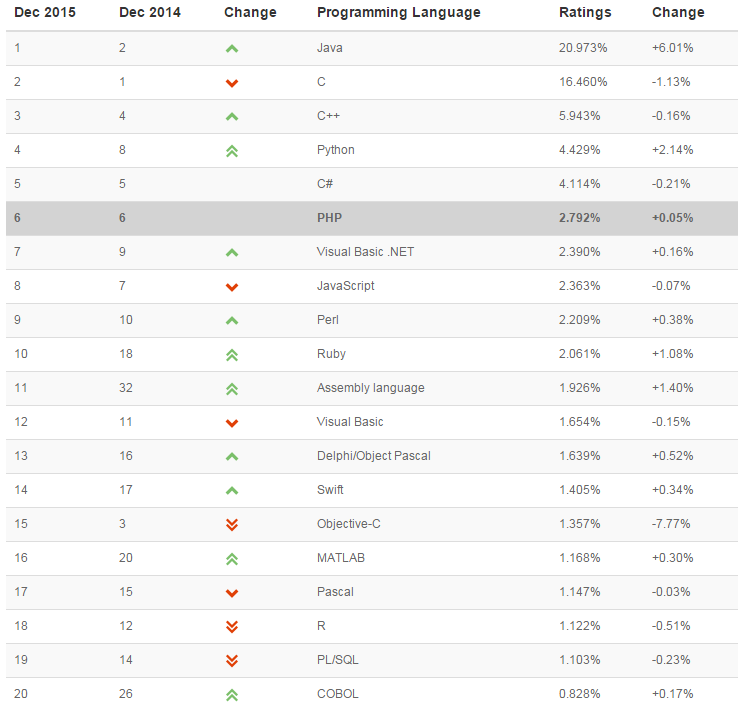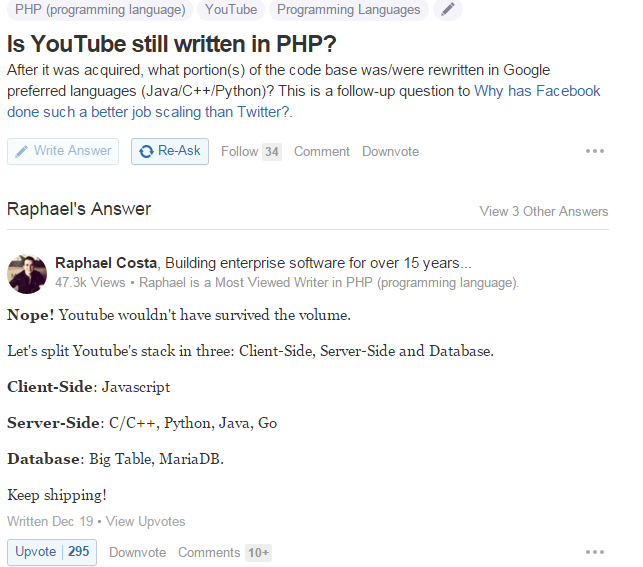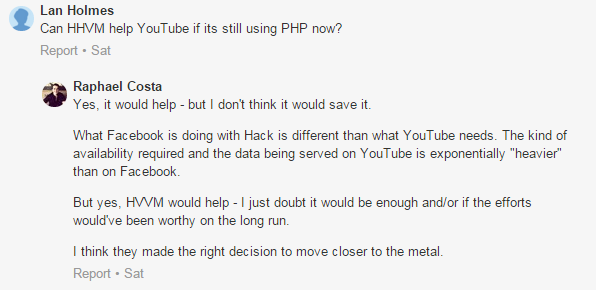One thing I keep running into is the claim that "PHP is out of fashion," which I don't quite understand considering PHP is the most popular server-side language on the entire Internet, and many of the top websites in the world use it. Indeed, even on Twitter recently I had this conversation (edited for readability, see link for context):
Faizan Javed (@faizanj): A bigger issue – what is it with valley startups and PHP?
Tony Showoff (@TonyShowoff): What do you mean? The polarisation of it, to where either it's evil or it's the only thing used?
Faizan Javed (@faizanj): the intense focus and controversy over an arguably out-of-fashion language.
Tony Showoff (@TonyShowoff): Java is also "out of fashion" but still used, PHP is used by more web sites than any other language. I think it's inadequacy. A lot of things go in and out of fashion, but fashion doesn't reflect usefulness. Remember the coming p2p/push/xml/etc revolutions?
Faizan Javed (@faizanj): one can argue Cobol and Fortran are also still useful in their domains. But hip, cool and mainstream they are not.
Tony Showoff (@TonyShowoff): So is hand looming one could say, but half of all internet sites don't use COBOL and half of looms aren't hand driven.
Like underwear, PHP is becoming cleaner, as if it's been washed with Tempa-Cheer on double rinse at high heat.
I think he does bring up a good point and question though. Are COBOL and Fortran fashionable at all since they still are in use, mostly in the realm of maintenance? Well, maybe, but I don't think so. As I tried to point out as best I could on Twitter, niche use cases are not the same thing as something being ubiquitous. Just as you can still find handloomers that doesn't mean machine looming is falling out of fashion, despite the rise in custom hand made items on etsy.com
I think people often confuse what's cool with what's in fashion and what's useful or available. This is less of a big deal in pop culture trends, but in the computer world it doesn't really make much sense. Sure, PHP may not be cool, I'm not sure if it ever was, but that doesn't change the fact that to this day when you want to find a web host, almost always they have PHP hosting available and not much, if anything else. Despite Python and Ruby becoming more hip, along with Erlang and the less useful other things which are some goofy spin off of another thing, they simply aren't available everywhere or ubiquitous.
So, in a sense, asking whether or not PHP is in fashion is sort of like asking whether or not underwear is in fashion. Sure it may be cool, or sexy, not to wear it, but for the most part you'll find it everywhere you look. Is that a bad analogy for PHP? Maybe, but reflecting PHP's problems over the years, I think it's pretty apt, but like underwear, PHP is becoming cleaner, as if it's been washed with Tempa-Cheer on double rinse at high heat.
But what about the numbers (click image for source information)?
And finally, what about as far as community help goes? After all, a programming language's success and usability these days often relies on thriving communities. Well…
Uncool? Maybe, but no programming language has ever been cool. Out of fashion? I don't think so.




